
In a historic show of support for striking autoworkers, President Biden became the first sitting U.S. president to join a picket line Tuesday when he joined UAW members outside a General Motors facility in Wayne, Michigan. The American Prospect's executive editor David Dayen says the Biden administration's support for the union is a big shift from how the Democratic Party has treated organized labor in recent decades. “The mentality of the Obama administration and the Biden administration, as far as it relates to worker power, couldn’t be more stark,” he says. The union launched a strike against the Big Three manufacturers — Ford, GM and Stellantis, parent company of Chrysler — earlier this month in a bid to raise pay and benefits amid record profits for the companies. There are now 18,000 workers on strike at 41 facilities across 21 states, and UAW President Shawn Fain has threatened to keep expanding the strike if needed. Dayen recently went to a picket line in Ontario, California, and reported that striking workers have twice had guns pulled on them by nonunion truckers seeking to use a distribution center to move auto parts to dealers.
Transcript
AMY GOODMAN: This is Democracy Now! I’m Amy Goodman, with Juan González.
President Biden made history Tuesday by becoming the first sitting president to stand with striking workers on a picket line. He joined autoworkers outside a GM distribution center in Wayne County, Michigan.
PRESIDENT JOE BIDEN: You made a lot of sacrifices. You gave up a lot. And the companies were in trouble. But now they’re doing incredibly well. And guess what: You should be doing incredibly well, too. It’s a simple proposition. It’s just about being fair. Folks, stick with it, because you deserve the significant raise you need and other benefits. So, let’s get back what we lost, OK? We saved them; it’s about time for them to step up for us. Thank you.
AMY GOODMAN: There are now 18,000 autoworkers on strike at 41 facilities across 21 states. UAW President Shawn Fain accompanied Biden on the picket line.
SHAWN FAIN: We do the heavy lifting. We do the real work, not the CEOs, not the executives. And though we don’t know it, that’s what power is. We have the power. The world is of our making. The economy is of our making. This industry is of our making. And as we’ve shown, when we withhold our labor, we can unmake it.
AMY GOODMAN: Republican presidential front-runner Donald Trump is heading to Detroit today, instead of taking part in tonight’s Republican debate. Trump is scheduled to speak to autoworkers at a nonunion auto parts maker.
To talk more about the UAW strike, we’re joined by David Dayen in Los Angeles, executive editor of The American Prospect, who recently went to a picket line in Ontario, California, where striking workers have twice had guns pulled on them by nonunion truckers seeking to use a distribution center to move auto parts to dealers.
David, welcome back to Democracy Now! I want you to describe that scene, but first respond to President Biden making history on the picket line of the UAW.
DAVID DAYEN: Well, you’re absolutely right: It was historic. I mean, seeing a sitting president walking a picket line is something we’ve never seen before in the United States. And the contrast with Donald Trump tonight, who will be at a nonunion shop that is — he was there at the request of management, is undeniable. Unfortunately, some of the mainstream media are saying that he’s talking to UAW workers. Nothing could be further from the truth. This is a nonunion shop. And unfortunately, we’re getting this false equivalence. But, you know, I think that the Biden administration has laid down a marker about what they believe should be a just transition for autoworkers.
JUAN GONZÁLEZ: And, David, why has it taken so long for a sitting president to actually put their actions whether their mouths are in terms of striking workers? I think back, President Obama, who so many progressives believed was an important progress for American politics, his auto task force guy, Steven Rattner, has come out basically saying it’s outrageous for Biden to take to the UAW picket line, and has criticized the autoworkers for making demands that are considered by Rattner to be way out of line.
DAVID DAYEN: Well, President Obama promised to walk picket lines when he was a candidate, and then never did so as president. And Steve Rattner was the head of the auto bailout, which forced concessions on the UAW, which they took, to try to save the companies in 2009. However, they’re well beyond being back to health and have not received any reversal of those concessions. When I talked to workers in Ontario, they told me that they lost their cost-of-living adjustment. They lost even a five-minute break that they used to get to wash up between shifts. So, obviously, I think Rattner is a little embarrassed by the fact that he negotiated these concessions and they’ve never returned to the workers, the benefit of the workers, and so that’s the mentality. And the mentality of the Obama administration and the Biden administration, as far as it relates to worker power, couldn’t be more stark than with that comment that Rattner made.
JUAN GONZÁLEZ: And I wanted to ask you about the strategy of the United Auto Workers this time around. It’s been very unusual compared to previous labor conflicts, in that they haven’t chosen to send all of the autoworkers out on strike at the same time, but have chosen key plants or sectors of the auto industry to go out on the street. The result has been — because, as you know, strikes, if they last a long time, they tend to fade in the public consciousness and in the media. But by continuing to keep the industry not knowing exactly what their next move will be, it’s also kept the strike in the public eye.
DAVID DAYEN: Exactly. And I think when I talk to workers, they appreciate it. It’s kept the companies off balance. It has enabled the UAW to play one company off the other. In the second round of this stand-up strike, they went out at parts distribution centers for GM and Stellantis, but they said, “Well, look, we’re making good progress in negotiations with Ford, so we won’t strike those Ford distribution centers.” So, it’s allowed them to sort of pit the companies against one another. It’s kept the companies guessing to where this problem is going to occur in terms of their logistics network, their workflow. And, you know, it has these benefits that you talk about in terms of keeping the strike in the public eye. And so, until there’s an agreement at the bargaining table, I expect this to continue.
AMY GOODMAN: David Dayen, we just have a minute. I want to ask you two questions, one about the guns being drawn on workers on the picket line in Ontario, California, and the other on the close relationship between Mary Barra, who’s CEO of General Motors, where President Biden chose to stand with the striking workers — she’s been to the White House something like eight times since he’s become president. He has cultivated that relationship with her as she leads the EV transition, that autoworkers are concerned about.
DAVID DAYEN: Yeah. So, where I went to in Ontario, it’s a parts distribution center for Stellantis. And the truck drivers go into the facility to exchange goods so that they get out to dealers.
AMY GOODMAN: We have 15 seconds. Sorry, David.
DAVID DAYEN: You got it. OK. So, these are nonunion truckers. The Teamsters won’t cross the picket line. And so, what happened is that the picketers blocked the entrance to the doors. On two occasions, guns have been drawn; fortunately, no violence. But there’s a lot of [inaudible] —
AMY GOODMAN: David Dayen, we’re going to have to leave it there, but continue the conversation.

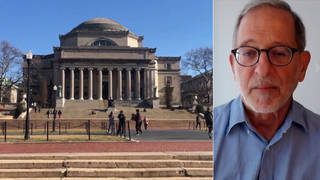
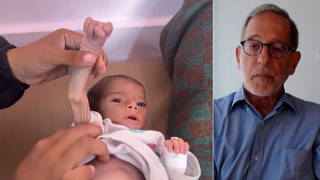
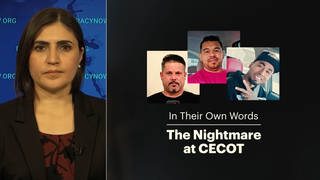
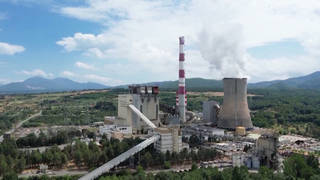





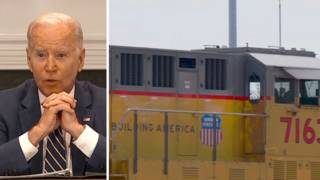


Media Options